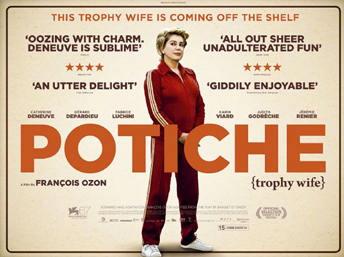Potiche ****
 The reluctance that some non-French mainstream markets have in promoting a foreign-language film is thankfully subsiding year on year, considering the abundance of talent these films bring – take Point Blank/ À bout portant most recently, and the international crossover of their stars and themes. In fact, a film like François Ozon’s Potiche should translate in whatever language it’s shown in, purely for its universal, off-the-wall theatrics delivered by a superb cast of internationally renowned greats, Catherine Deneuve, Gérard Depardieu and Fabrice Luchini.
The reluctance that some non-French mainstream markets have in promoting a foreign-language film is thankfully subsiding year on year, considering the abundance of talent these films bring – take Point Blank/ À bout portant most recently, and the international crossover of their stars and themes. In fact, a film like François Ozon’s Potiche should translate in whatever language it’s shown in, purely for its universal, off-the-wall theatrics delivered by a superb cast of internationally renowned greats, Catherine Deneuve, Gérard Depardieu and Fabrice Luchini.
An adaptation of a 1970s eponymous hit comic play, Potiche is set in a provincial French town in 1977, and tells the fun tale of submissive housewife Suzanne Pujol (Deneuve) – or ‘potiche’/‘trophy housewife’ – who goes about her ‘wifely’ household duties (cooking, sewing, gardening etc), until her stressed out and tyrannical husband Robert (Luchini) has an bad episode when the workers of the family umbrella firm go on strike and take him hostage. On the suggestion of her former flame and leftist mayor Maurice Badin (Depardieu), Suzanne steps in to take control. But far from being easy to manipulate – as hubby and mayor believe, she does a remarkable job of turning fortunes and feelings around, proving to be an approachable, competent and assertive businesswoman. Then her husband returns to work and wants things back to normal – mainly so he can carry on his secret fling with his infatuated secretary. But Suzanne is not prepared to go quietly.
Potiche is a liberating giggle with a prominent French slant that stands out in the crowded, comic-book film offerings of late. It’s nuances and farcical antics make for an instant light and frothy crowd-pleaser. But as a film, it would be rather forgettable if it were not for Deneuve’s compelling lead. Far from banging the feminist drum about the suppression of women, or being a subversive type too mousey to have any meaningful impact, Deneuve as the potiche Suzanne brings a winning matter-of-fact accord to the part, almost a bitter-sweet one tinged with sarcasm and true French arrogance that shows she’s still alive and kicking inside. Coupled with Deneuve’s screen stature, this exquisite combination allows you to fully believe in Suzanne’s rise to notoriety in the final scenes.
Indeed, there are some delightful moments, especially one where a frumpy, naïve Suzanne, reminiscent of a tweet-suited Thatcher doppelganger, boogies away on the dance floor to Saturday Night Fever tunes with an equally out-of-place and paunch Badin in a local seedy nightclub, the regular haunt of her husband’s (the film’s running joke) that provides the biggest, straight-laced laugh of the film. Depardieu is his usual oafish self and the match of their opposing personalities is a comedy marriage made in screen heaven that staves off the wonderfully devious, stroke-inducing antics portrayed by Luchini as chauvinistic Robert. Each personality certainly brings something of their own to the table, here.
Very much about the gender politics of the time, and particularly the woman’s place at home and at work in 1970s France, the rest of the cast simply crank up the stage-like theatrics to over-dramatic boiling point to heighten these topical points and render the potiche the most sane player of the lot, while reminding you just where its origins lie.
However, Ozon’s adaptation works as well as a camp film as it does a gay stage show with characters we don’t take too seriously buzzing with joie de vive and chronic personal issues. However, its subject matter of women’s rights is still one of relevance today, over 40 years on, that will strike a chord with any woman watching. It’s this fact, along with its zippy dialogue and pace, that raises Potiche out of superficiality, and breathes an infectious fighting spirit to be heard into it.
4/5 stars
By @FilmGazer
WATCH THE TRAILER HERE